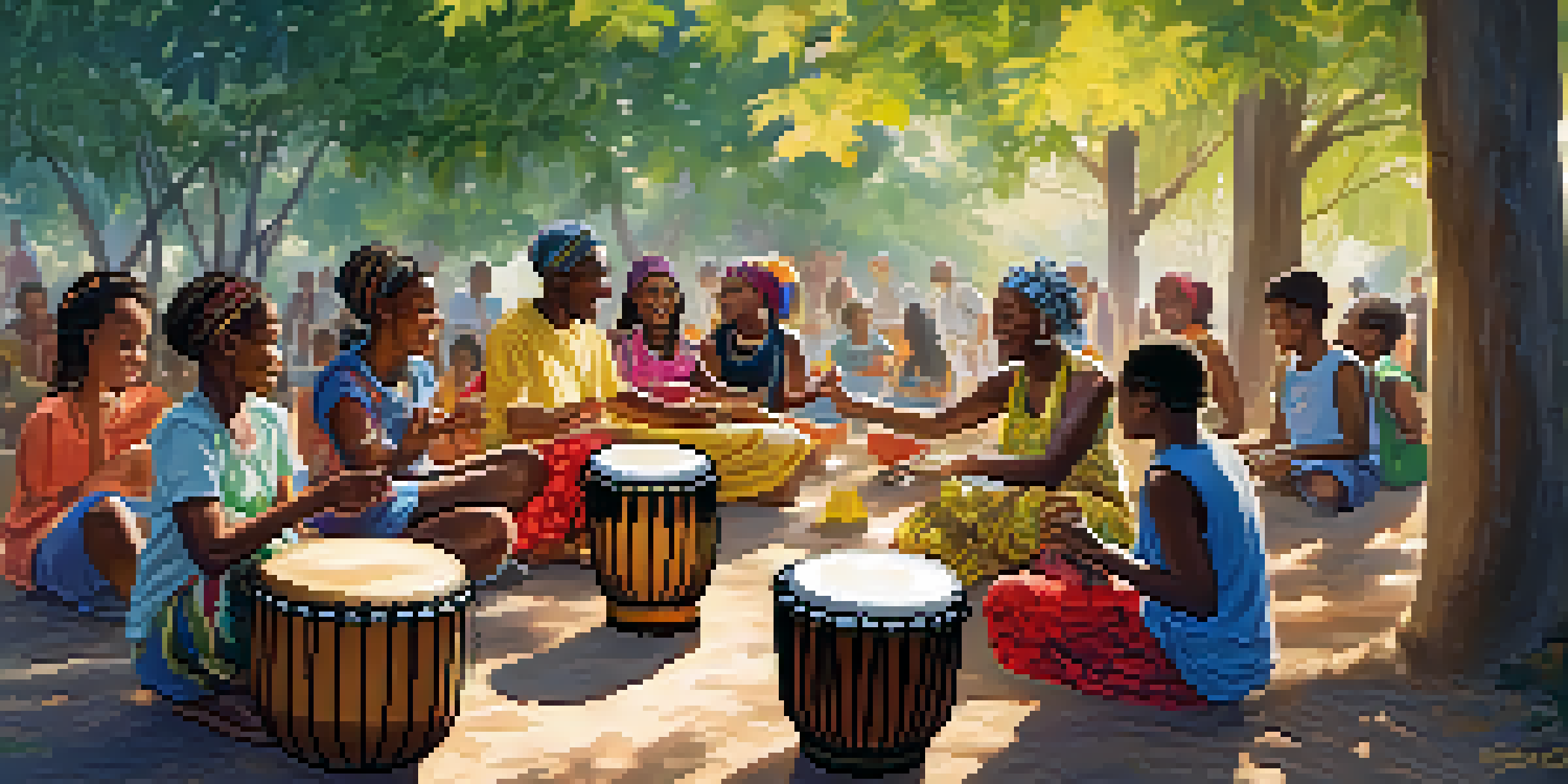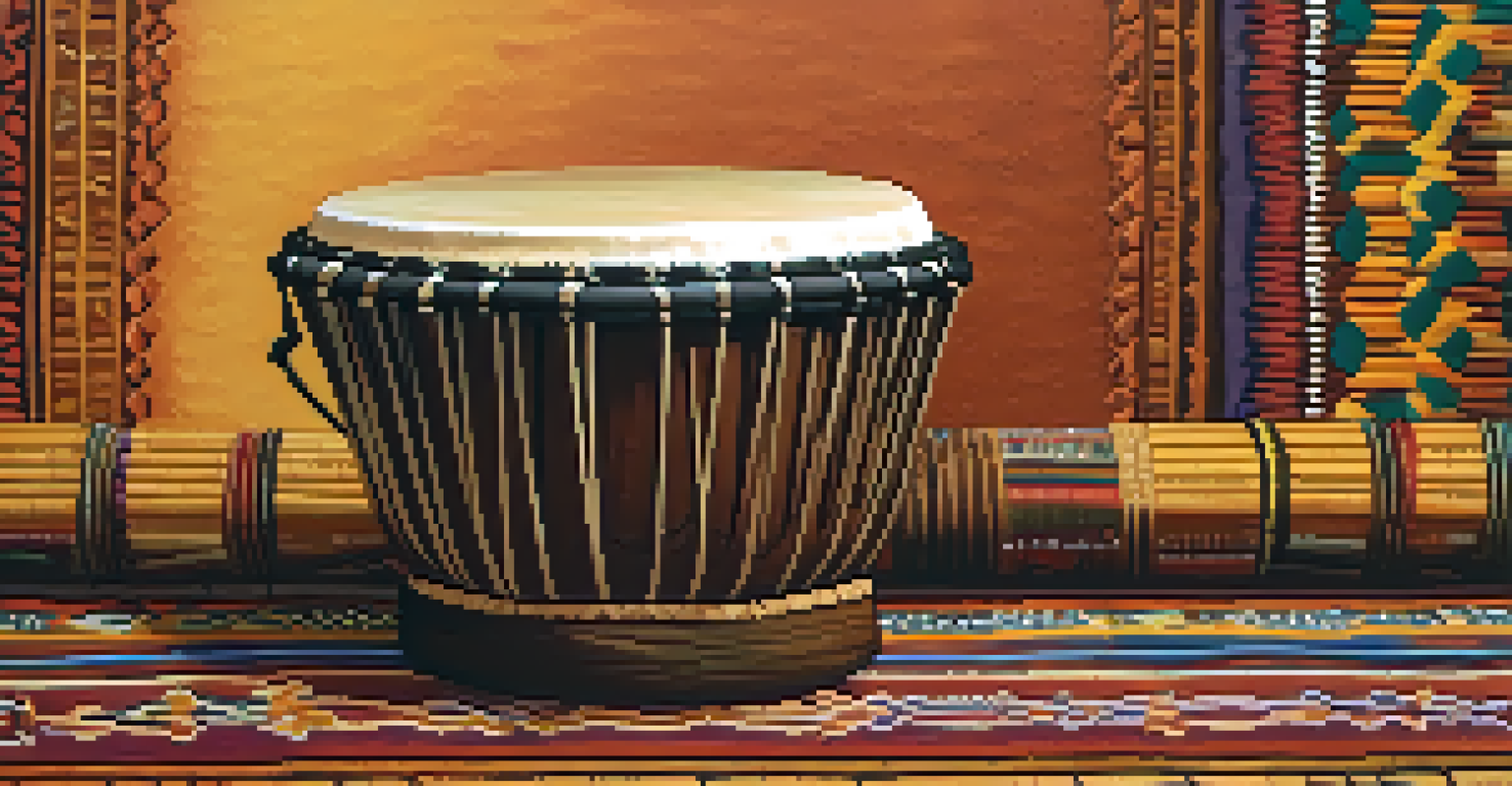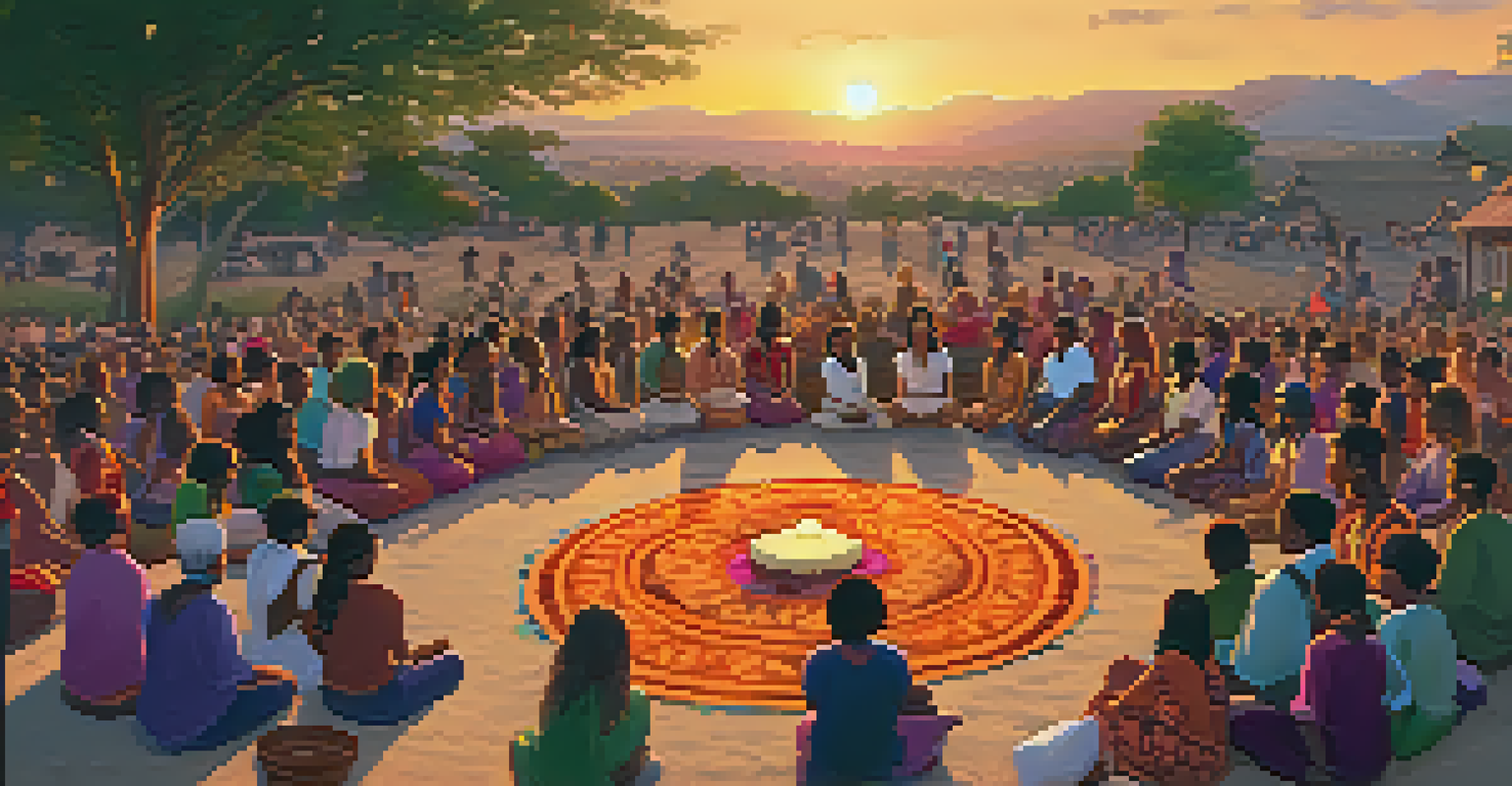African Drumming Workshops: Rhythms and Cultural Significance

The Heartbeat of African Culture: Drumming's Role
In many African communities, drumming is more than just a musical expression; it's a vital part of cultural identity. Traditionally, drums have been used in ceremonies, celebrations, and storytelling, serving as a bridge between generations. This rhythmic art form embodies the spirit of community, forging connections among people through shared experiences.
Drumming is the heartbeat of the community, connecting us all through rhythm and shared experiences.
Drum circles often flourish during social gatherings, where beats resonate with the laughter and voices of participants. These gatherings create a sense of belonging and a deeper appreciation for the culture. Just as a heartbeat unites us, so does the communal act of drumming, making it a powerful tool for connection.
Moreover, drumming serves as a medium for passing down traditions and teachings. Each rhythm and pattern tells a story, offering insight into the history and values of the community. By participating in drumming workshops, individuals can immerse themselves in this rich cultural tapestry.
A Journey into African Drumming Workshops
African drumming workshops provide a hands-on experience that is both educational and entertaining. Participants often begin by learning the basics, including various drum types like the djembe and the talking drum. These instruments not only produce unique sounds but also have distinct cultural backgrounds and uses.

As participants progress, they dive deeper into the different rhythms characteristic of various African cultures. Instructors typically encourage improvisation, allowing individuals to express their creativity while staying connected to the traditional beats. This blend of structure and freedom fosters an engaging learning environment.
Drumming Fosters Community Connection
African drumming workshops create a sense of belonging by bringing people together to share rhythms and experiences.
Additionally, workshops often emphasize the importance of listening and collaboration. Drumming is not just an individual endeavor; it's about harmonizing with others. Participants learn to hear the nuances of each rhythm, creating a cohesive sound that reflects the power of teamwork.
Benefits of Participating in Drumming Workshops
Participating in African drumming workshops offers a plethora of benefits, both mentally and physically. Engaging with rhythm can enhance cognitive functions, improving memory and concentration. The act of drumming releases endorphins, which can elevate mood and reduce stress levels, making it a therapeutic exercise as well.
Music can change the world because it can change people.
Moreover, these workshops provide a unique opportunity for cultural exchange. Participants from diverse backgrounds come together, sharing their experiences and perspectives. This not only fosters understanding but also enriches the learning experience, as everyone brings their own flavor to the rhythm.
Lastly, drumming promotes physical coordination and rhythmical skills. As participants learn to synchronize their movements with the beat, they also improve their overall motor skills. This physical engagement can be particularly beneficial for individuals of all ages, making drumming accessible to everyone.
Cultural Significance of the Djembe Drum
The djembe drum, originating from West Africa, is one of the most popular drums used in workshops. Its construction, typically from a carved wood body and animal skin, allows for a range of tones—making it incredibly versatile. The sound of the djembe can convey a variety of emotions, from joy to sorrow, reflecting the depth of human experience.
Culturally, the djembe is often referred to as the 'people's drum,' as it is used in both celebratory and somber occasions. Its role extends beyond music; it is a tool for communication, conveying messages and stories that resonate within the community. Understanding this context enhances the appreciation of the rhythms learned in workshops.
Djembe: The Heart of African Culture
The djembe drum serves as a versatile instrument that conveys emotions and cultural stories, enhancing participants' appreciation of its heritage.
In workshops, participants often engage in learning traditional djembe rhythms, allowing them to connect not only with the music but also with the cultural heritage it represents. As they play, they embody the spirit of the drum, participating in a lineage that has endured for centuries.
Exploring the Healing Power of Rhythm
Drumming is often recognized for its therapeutic benefits, particularly in group settings. The rhythmic vibrations can create a sense of unity, helping individuals feel more grounded and connected. Many participants find that drumming allows them to express emotions that are hard to articulate, serving as a form of emotional release.
In various cultures, drum therapy is utilized to promote healing and wellness. This practice harnesses the natural rhythms of the body, encouraging participants to tap into their inner selves. The physical act of drumming can help reduce anxiety and improve mental clarity, making it an effective tool for personal growth.
As individuals engage in the healing rhythms of drumming, they often report feeling a sense of empowerment. The act of creating music together fosters a supportive environment, where individuals can explore their vulnerabilities and strengths. This transformative experience can lead to lasting changes in how participants view themselves and their place within the community.
Connecting with Community Through Drumming
One of the most beautiful aspects of African drumming workshops is their ability to bring people together. Regardless of background or skill level, everyone is welcome to join in the rhythm. This inclusivity fosters a sense of belonging, allowing participants to connect with one another on a deeper level.
During workshops, participants often share stories and experiences, creating a rich tapestry of connections. As they drum together, they build friendships and support networks that reach beyond the workshop itself. These shared experiences allow individuals to feel a part of something larger than themselves.
Therapeutic Benefits of Drumming
Engaging in rhythmic drumming can promote emotional release, reduce anxiety, and foster personal growth in participants.
The sense of community fostered in drumming workshops often extends into participants' daily lives. Many find themselves joining community drum circles or engaging in cultural events, further deepening their connection to the art form. This ripple effect showcases the power of drumming to unite and inspire.
The Future of African Drumming Workshops
As interest in African drumming continues to grow, so does the evolution of workshops. Modern workshops often blend traditional techniques with contemporary styles, attracting a wider audience. This fusion allows participants to experience the richness of African drumming while also exploring personal expression.
Technology also plays a role in the future of drumming workshops. Online classes and virtual drum circles provide access for individuals who may not be able to attend in person. This accessibility broadens the reach of this cultural art form, making it available to anyone eager to learn.

Looking ahead, the challenge will be to maintain the authenticity of traditional rhythms while embracing innovation. By honoring the roots of African drumming, workshops can continue to thrive, ensuring that this vibrant cultural heritage is passed down to future generations.